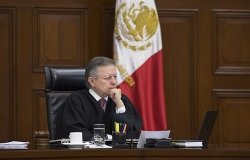Egypt’s Crackdown on Political Speech
The political climate in Egypt, a country that accounts for one-quarter of the Arab world’s population, has become increasingly inhospitable to public debate or criticism. What is Egypt afraid of?
What is Egypt afraid of? A mighty country and its military leadership diminished their credibility when Egypt denied entry to an American scholar on Friday. Michele Dunne, a former U.S. diplomat who had served in Cairo and on the National Security Council, had been invited to a conference by the Egyptian Council for Foreign Affairs. She was detained for six hours at the Cairo airport and then deported.
A security officer reportedly told her, “Madame, you cannot access Egypt anymore.”
Michele Dunne is hardly a threat to Egypt. Nor is the group that sponsored her trip. The Egyptian council is composed of current and former Egyptian diplomats, pro-government foreign policy pundits, and high-profile commentators. I was a keynote speaker at the same conference several years ago during the Mubarak era. There was not a dissident in the crowd.
Egypt is eager to take American taxpayers’ money, which it receives to the tune of $1.5 billion a year, largely in military aid. But its government is unwilling to tolerate the opinion of one widely respected former diplomat who is now a fellow at the Carnegie Endowment for International Peace.
On Saturday, Ms. Dunne tweeted, “Some Egyptians complain I don’t list enough to pro govt views. When I accept invite to conf of pro govt group they deny me entry. Go figure.”
Under military rule, Egypt has become increasingly repressive. In 2013, a criminal court in Cairo convicted 43 employees of non-governmental organizations, including 16 Americans, of operating without a license—even though many had worked in Egypt for years and their formal applications for operating licences were also pending for years.
One of the Americans tried in absentia was Sam LaHood, son of then-Transportation Secretary Ray LaHood. He was among the more than two dozen sentenced to five years in jail.
Since mid-2013, Egypt has acknowledged detaining at least 22,000 of its citizens, according to Human Rights Watch. The Egyptian Center for Economic and Social Rights, which documents every arrest, puts the total at 41,000. Egypt has also sentenced more than 1,400 people to death this year, although some cases are under review, Human Rights Watch has reported.
The political climate in Egypt, a country that accounts for one-quarter of the Arab world’s population, has become increasingly inhospitable to public debate or criticism. The Cairo Institute for Human Rights Studies announced this month that, after two decades in Egypt, it would move to Tunisia.
Ms. Dunne, who is widely considered among the most thoughtful U.S. analysts on Egypt, is not the only Carnegie scholar to face problems. Amr Hamzawy is a former Carnegie associate who returned to Egypt to establish a political party and teach at American University in Cairo. He was elected to parliament in 2011 in the country’s first free legislative elections, but that body was later dissolved by the courts. The New York Times reported this weekend that he had been barred from leaving the country for several months for insulting the judiciary.
After news of Ms. Dunne’s experience went viral on social media, Egypt’s foreign ministry charged that she had tried to enter the country without a proper visa.
In response, Ms. Dunne tweeted, “US citizens are allowed to obtain a visa at the airport for business as well as tourism in #Egypt. I checked ‘conference’ on the entry form.”
The Egyptian Council for Foreign Affairs said it would not challenge the rejection of its guest. “[T]he security apparatus knows better about these situations and is keen on the stability of the country,” its vice president told Mada Masr, an online publication.
This episode, and Egypt’s growing abuse of human rights, indicate how surprisingly vulnerable the government of former general Abdel Fattah Al Sisi must feel.
The opinions expressed here are solely those of the author.
This article was first published on The Wall Street Journal's Washington Wire.
About the Author

Robin Wright
Author and columnist for The New Yorker

Middle East Program
The Wilson Center’s Middle East Program serves as a crucial resource for the policymaking community and beyond, providing analyses and research that helps inform US foreign policymaking, stimulates public debate, and expands knowledge about issues in the wider Middle East and North Africa (MENA) region. Read more









